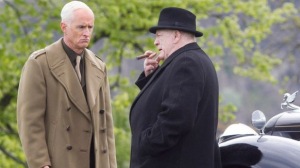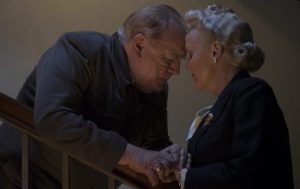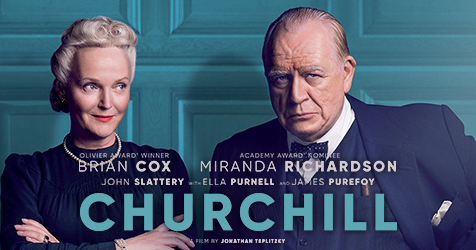Star Rating: 3.5/5
Director:
- Jonathan Teplitzky – Better Than Sex, Burning Man, The Railway Man
Cast:
- Brian Cox – Bourne I & II, Coriolanus, Rise of the Planet of the Apes, Her, Strange But True
- Miranda Richardson – Empire of the Sun, The Hours, Harry Potter IV & VII(i), Belle, The Happy Prince
- John Slattery – Madmen, Iron Man II, The Adjustment Bureau, Spotlight, Captain America III
- Richard Durden – The Bill, Trial & Retribution, Agora, The Awakening, Dickensian
- Julian Wadham – The English Patient, Exorcist: The Beginning, The Iron Lady, The Happy Prince
- Danny Webb – Alien III, Valkyrie, The Bill, Locke, Pegasus Bridge
- James Purefoy – A Knight’s Tale, Rome, Ironclad, High-Rise, Interlude In Prague
- Ella Purnell – Never Let Me Go, Maleficent, Kick-Ass II, Miss Peregrine’s Home For Peculiar Children, UFO
Music Composer:
- Lorne Balfe – Ironclad, Terminator Genesys, The Lego Batman Movie, Ghost In The Shell, Horse Soldiers
Winston Churchill, Prime Minister of Britain 1940-45 & 51-55, has been mythologised. “History will be kind to me if I write,” Winston once said. Well, he did write it: a six volume series about World War II after it concluded. Unsurprisingly, history has been very kind to him ever since and Churchill has gone down as a legendary war hero that would fit right into Ancient Greek mythology. But what was he actually like as a person? Director Jonathan Teplitzky gives us an answer, but not without issue.

Winston Churchill (Brian Cox), smoking a Churchill cigar, contemplating events of two decades past as he walks along the beach.
Churchill is a drama centred round Winston Churchill (Brian Cox) in the days leading up to D-Day (6th June 1944). The movie opens with Winston walking along a beach, remembering the failed Gallipoli campaign during World War I, when he was responsible for the death of more than 150,000 Allied soldiers. Winston is tormented by these memories; the loss of life weighs heavily on his shoulders. This causes him to obstruct Operation Overlord, the proposed invasion of Normandy, as he does not want another slaughter on the beaches.
Churchill makes for interesting viewing. The film casts Winston not as the myth we know, but as the human being he was. He still has the haughty sense of humour that went hand-in-hand with his self-conceit, the great oratory skills, and the bulldog hunch of a man on a mission, plus he chews/smokes enough of his famously long cigars to get lip cancer by the end of the movie’s 105-minute running time. Yet, Churchill also portrays him as a ‘has been’ and deeply flawed. The Winston here cannot understand why people don’t listen to him; is an alcoholic after being worn down by four years of war; a bully to his secretary (Ella Purnell); a poor, inattentive husband to his wife, Clemmie (Miranda Richardson); and a pain in the backside to the British and American generals. (All the film-makers needed was to add Churchill’s racism and then it would have been complete.)

Winston, smoking a cigar, lectures an unimpressed-looking General Dwight D. Eisenhower (John Slattery), who was the Supreme Head of the American (and Allied) forces in Europe during WWII. He clashed with Churchill often as the war went on.
The way Churchill is portrayed in the movie, though, is generally thought-provoking, and it is fascinating to see how his past experiences affect his decision-making. But when it comes to the preparations for Operation Overlord, Churchill takes events past the point of credulity (and probably historical accuracy too) by showing us that he was vehemently opposed to the D-Day plans, per se. It is true that in 1944 Winston had doubts over whether the Normandy landings would succeed (which could easily be coupled with how many men he feared would die in the operation, whether it succeeded or not). This is understandable (and moral), even without him being haunted by the events of 1915. Nevertheless, this is different from being categorically against even the idea of the operation. The academic, Nigel Hamilton, argues that the Prime Minister disagreed with the Normandy landings until he got an agreement from the Americans about working together on the nuclear bomb. This makes sense in the grander context of the era (which Churchill does not explain), and if the film would have gone down this route it would have demonstrated Winston’s political acumen. But it doesn’t. Instead, the movie has us believe that the Prime Minister prayed for God to unleash the heavens, biblical-style, so that D-Day would be called off. This does not seem to glove with Winston’s personality, and one wonders whether the film-makers had an ulterior motive for this perspective. (Anti-atomic weapons, anti-war, perhaps?)
Another problem with Churchill is that every line Winston delivers is spoken vociferously, as if to an auditorium (or history). This may have been what Churchill was like, but for a drama this should have been toned down. Before long, Winston’s need to practice his oratory for even the most banal of issues becomes tedious and risible. (It also makes viewers think that Teplitzky once read a book on Churchill’s hundred most famous quotes and tried to throw in as many as possible.)

Winston and Clemmie (Miranda Richardson) on the steps. Leading Britain and the Empire through the war takes its toll on Churchill and it is then that he needs his wife’s unfailing support. But only on his terms.
Otherwise, one can admire much about Churchill. The script is really good for what it aims to achieve, and it is humorous in the right places too. The cinematography of beaches, countryside manors, palaces and bunkers, is apt and gives viewers a decent taste of Churchill’s working environments during World War II. Furthermore, the actors all play their parts well, masterfully so in the cases of Brian Cox and Miranda Richardson. More than anything, it is through Richardson’s character/Clemmie that we see how difficult Churchill was as a person; that the gallant war hero of popular culture is just the myth that he created.
All-in-all, Churchill is a stimulating drama. It shows Winston Churchill as a man, plagued by the horrors of the Gallipoli disaster and intoxicated by whiskey and the paradox of his virtuoso and his doubts. However, one cannot escape the feeling that the film exaggerates the Prime Minister’s views on Operation Overlord at best, and gets them wrong at worst. To depict Churchill as utterly against the concept of an Allied invasion of Nazi-occupied France seems implausible; especially, if we are to believe that this is the same man who was hell-bent on the obliteration of Hitler’s Germany.
PG’s Tips





